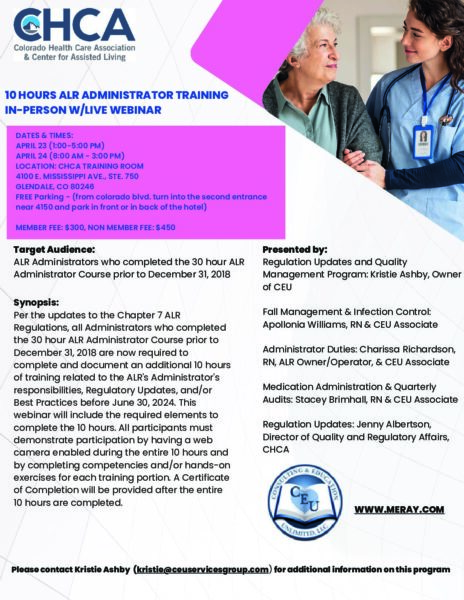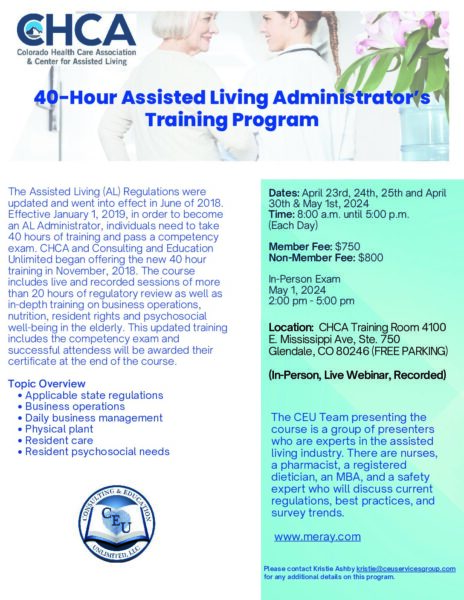CHCA Requests on Behalf of Providers
Below are several items for which CHCA has requested assistance on behalf of providers that are not year resolved. To be clear, these requests have NOT BEEN APPROVED at this point, but have been requested. We will provide updates as we hear back on our requests.
Requested from HCPF:
- Waive PASRR Requirement: We are requesting a full waiver of PASRR requirements for the duration of the COVID event in Colorado. Additionally, we have requested formal recognition that waiving the PASRR process during the emergency would need to include waiving the 50% psych limitation during and immediately following the COVID event.
- Staffing Flexibility: We are requesting the authority to use non-CNA to perform assistive tasks and still be reimbursed through Medicaid.
- Presumptive eligibility: We are requesting that the state move to presumptive eligibility for long term care. Having long term care providers wait for eligibility determinations (or risk nonpayment) will have a significant impact on the ability to quickly transition appropriate patients from hospitals to nursing homes. Presumptive eligibility will ensure the most efficient movement of Coloradoans to the most appropriate care setting.
- Clearing Eligibility Backlog: We have asked for HCPF to help approve outstanding 5615s and redeterminations at the state level. We know that there are a growing number of cases backed up at the county level, and have asked that the state make some determination at the state level that will allow for at least temporary approval until the COVID event concludes.
- Waive Re-Cert Timelines: We have asked HCPF to waive the 60 day timelines for Medicare certification visits from physicians.
Requested from CDPHE:
- Detailed Information on COVID Cases: We have asked CDPHE to provide ongoing access to information on which health care facilities in Colorado have confirmed COVID cases. We want to make sure that all health care workers know where there are active cases in their areas, especially for the purpose of screening employees that might work in multiple settings.
Requested from Governor
Safely Expedite Transfer of Patients from Hospitals to Nursing homes
Under current guidance most nursing home providers are not accepting transfers from hospitals with known COVID exposure unless the patient requesting transfer has a clear COVID test result. Some hospitals are understandably putting pressure on nursing home providers to take residents without test results in the interest of freeing up bed space in hospitals. Bringing in new residents without clear test results jeopardizes the safety of residents currently living in nursing homes. We are also aware that current testing protocols can take in excess of 5 days to produce a result. To ensure the protection of those Coloradans most susceptible to COVID-19 we request the following:
- The Governor declare that no hospital patient shall be transferred to a nursing home without a negative result from a COVID-19 test unless the receiving nursing home has already developed a separate specialized unit for treating COVID positive residents. Exception could be granted for transfers from Interim Treatment Facilities.
- That hospital patients who can be appropriately cared for in a nursing home receive top priority for COVID testing in order to expedite their safe transfer and create critical space in hospitals.
Enhance Safety & Security of Residents and Staff
Colorado’s Public Health Order was a strong step to restrict entry to nursing homes and assisted living residences. However, current regulation requires that we allow the free movement of residents in and out of our care communities. We cannot monitor what residents do if they leave our care communities, and whether they are complying with sound public health measures. Allowing the free flow of residents creates a significant risk to those residents who continuously remain in the community. In order to ensure the safety and security of all residents we request the following:
- The Governor declare that residents of long-term care communities who chose to leave those communities against the advice of care community staff or Against Medical Advice (AMA) shall not be allowed to return to the care community throughout the duration of the COVID-19 outbreak in Colorado.
Create Expedited Availability of Needed Health Care Workers
As long-term care communities screen workers for signs of illness, the number of available workers is dwindling. The closure of schools throughout Colorado is also causing some workers to choose to stay home instead of working. Long-term care needs access to willing workers immediately. In order to help provide needed staff in long term care settings, including both nursing homes and assisted living residences, we request the following:
- The immediate development of an Emergency Certified Nurse Aide certification through DORA. The emergency CNA could perform more limited tasks than a regularly certified CNA but could assist with tasks such as feeding, dressing, toileting, daily hygiene tasks, and others. This emergency CNA would receive training from their employer before working with residents, and the completion of that training would be documented by the employer.
- This will allow for quick access to needed caregivers, while allowing providers to be reimbursed for the costs of these employees through the Medicaid program.
- Extend the amount of time that those currently pursuing a CNA certification have to take their exam. Current rules require test taking within 120 days of hire, or they can no longer work in caregiving. With test sites closing, it is important that these caregivers be given an extension to complete their formal tests.
- Waive the requirement that background check results be received prior to beginning employment. Providers would still be required to submit a background check request at hire but could allow new employees to work with residents while awaiting results. Backgrounding processes have slowed down which slows the ability of ready workers to begin work.
- Waive requirements that in-house training and orientation take place prior to beginning work and allow employees to learn on-the-job. Guidance should remain that normal requirements be followed to the best of each providers ability, but in truly emergent situations this flexibility will be helpful.
- Waive minimum staffing requirements for the duration of the COVID event so that providers are not punished for a lack of available certified and licensed workers.
![Colorado Health Care Association [logo]](https://www.cohca.org/wp-content/themes/cohca/images/logo.png)









